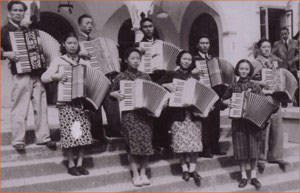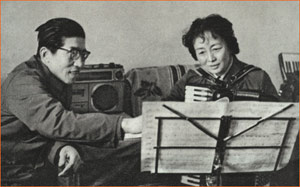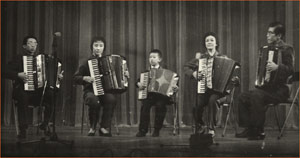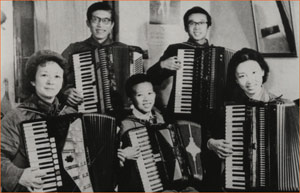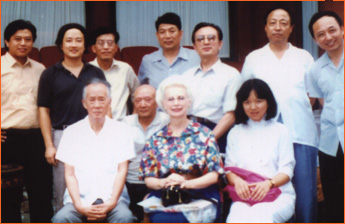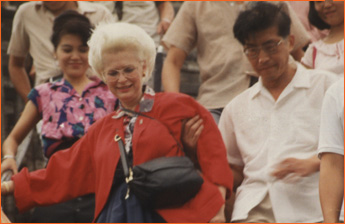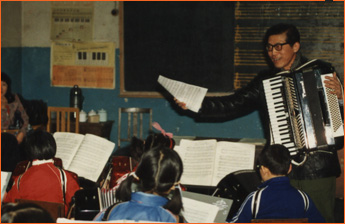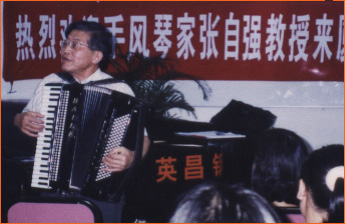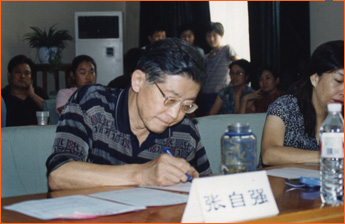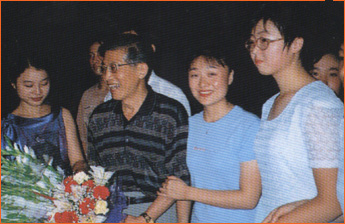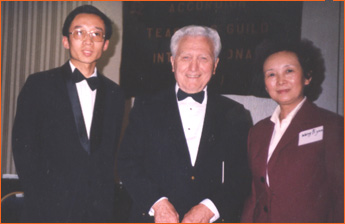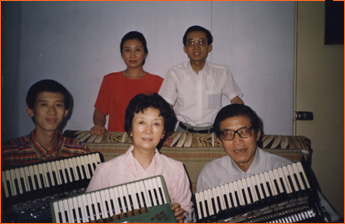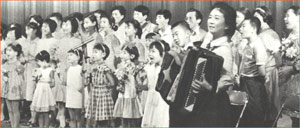|
Interview conducted by Kevin Friedrich,
5 May 2006.
|
This interview with Ziqiang Zhang was conducted in Shanghai, China in the
Spring of 2006.
Mr. Zhang served as the President of the Chinese Accordion Association for
many years, and we are thankful to him for taking the time to share some
information about the interesting accordion career of him and his family.
Sincerely,
Kevin Friedrich - Accordions Worldwide, USA
 |
Tell us a little about the town where you
were born, and where it is located? |
 |
I was born right here in Shanghai in 1929. I am now
78 years old and my wife is 76 years old. |
 |
How did you begin your music study and
why did you choose the accordion? |
| |
 I
joined the People's Republic of China Army in 1949 because the accordion
was the main instrument promoted by the government in the army.
I was 20 years old at the time, and began learning the accordion
when I enlisted in the army.
At this time, the army had a lot of professional performing groups
that toured to al the various army bases and surrounding Islands.
I was touring in an army group as part of the Chinese People's Liberation
Army Performance Troop. The Chinese People's Liberation Army Performance Troop usually
had three accordionists. In my group, there were three, myself,
my future wife and a button accordionist, who later moved to a different
army group.
|
 |
What are your earliest memories of performing
on accordion? |
 |
I began in 1949 with the army, but I remember in particular
one of my earliest concert performances on accordion was with the
group in 1952 when I accompanied a tenor and a soprano soloist in
the performance troop, as well as women's choir. |
 |
What was your time like with the Chinese
People's Liberation Army Performance Troop? |
 |
From my first performances, the show continued to develop through
1960. There were three accordionists. My wife and I were the main
ones, and one other played the button accordion. This button accordionist
later moved to a different army group. Some years later we recruited
and teaching more younger players who went on and started performing
accordionists in the group.
We were very busy from 1949 - 1966 when we performed everywhere in
China, Euopre, USSR, Korea and Poland etc… Since the accordion
is compact and portable, it was ideal to perform the entire program
including accompanying the singers etc… and so that was an incredible
advantage of accordion. In the show we also played solos and duets.
The accordion was a major instrument, as when travelling to alot
of places, there was no piano, so they always used the accordion.
Sometimes, while in our home base of Beijing, they would use the
piano and orchestra to accompany the choirs and singers, but we
always used the accordion on the road. Therefore, we were always
extremely busy.
In addition to performing we were also required to teach our fellow
soldiers to play the accordion when we were at different bases so
that in turn, that base would have semi professional musical troops
of their own. (Wang Biyun pictured above with the Romanian Folk
Orchestra)
The performance troops from other countries such as the USSR came
to China first. In 1952, the USSR Alexander Red Flag Army Ensemble
came to China, and shortly afterwards groups from Romania and other
Eastern European countries.
We actually had lots of exchange with those performance troops
and accordionists from other eastern European countries.
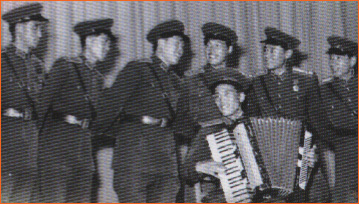 The first time we toured outside of China was in 1954 when we went
to USSR, Romania, Poland, Czechoslovakia and returned in 1955. This
was a long trip, and we had a lot of time to stay in the countries
and meet and exchange ideas and information with the local accordionists.
The first time we toured outside of China was in 1954 when we went
to USSR, Romania, Poland, Czechoslovakia and returned in 1955. This
was a long trip, and we had a lot of time to stay in the countries
and meet and exchange ideas and information with the local accordionists.
During these tours, we practiced and performed a lot and that is
how we improved our technique and ability, just from these exchanges
with accordionists from these other countries.
Ziqiang Zhang is pictured above left performing with the Polish
Choir and above right with the Russian Singers, both in 1955.
|
 |
Was your family musical and did your parents
play an important part in your early music education? |
 |
 I
just loved music and entered the army originally as a baritone. However,
I loved the accordion so much, I began the accordion in the army and
learned very quickly and son changed to the accordion. I
just loved music and entered the army originally as a baritone. However,
I loved the accordion so much, I began the accordion in the army and
learned very quickly and son changed to the accordion.
On my wife's side of the family it was different. My wife 'Wang Biyun'
was already an accordionist. She was from musical family. Her father
was a well known musician. She studied accordion, piano harmonica
and by the time she joined the army, she had already on all three
instruments, and in particular on the accordion, was quite accomplished.
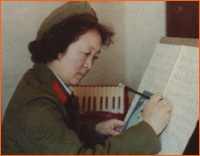 Since we were assigned to the same performing troop, this is how we
met. In 1954 when performing in USSR the Red Army Newspaper reported
in an article that the Chinese are here and called Mrs. Zhang 'Mrs.
Golden Finger.'
Since we were assigned to the same performing troop, this is how we
met. In 1954 when performing in USSR the Red Army Newspaper reported
in an article that the Chinese are here and called Mrs. Zhang 'Mrs.
Golden Finger.' |
 |
Tell us about your early (first) teacher
in Army?
|
 |
As I mentioned, my wife was from a musical family, she
played piano and accordion and harmonica and by the age of 15, she
had already performed on stage with all three. In the army, she was
my main teacher.
Luckily, I was a quick learner, and I also practiced extremely hard.
We encouraged each other, and with our dedication, we both helped
and inspired each other. I practiced day and night. I basically started
from scratch at 20 years old, with no keyboard experience whatsoever!
I was lucky to improve very quickly and because of my dedication,
I managed to improve very quickly.
|
 |
Do you have any humorous memories of your
concert experiences? |
 |
Once I was performing in Tibet on a really high mountain
and it was extremely cold and so I was wearing a big hat with flaps
that came down to cover my ears. On the hat, there is a big Red Star
on the front, however I accidentally put it on back to front. For
those sitting in front of me, they didn't realize as they couldn't
tell if there was supposed to be a red star or not... but all the
people sitting behind me were laughing because they could see that
in my haste, I had accidentally put the Red Star facing the back.
In addition to this humorous moment, there were also lots of very
hard times as well. We played in North Korea three times and basically
had to get through the fighting by staying down in the bunker.
|
 |
Is there any teacher or artist to whom
you would like to pay particular tribute, for their inspirational
effect on your musical career? |
 |
I can't think of a particular person, but for me, it
is the entire group. They are united as a team, enthusiastic and work
together. At the beginning of the 1990's the accordion was still the
most popular beginning instrument, with most people learning it. Now
the numbers of new students has decreased a little, because of the
changing life. The quality of life has improved, families have a little
more money, which in turn leads to more choices, so they are not only
just choosing accordion any more, they are choosing piano, violin
and from many other activities. |
 |
How has your musical career impacted on
your personal life? |
 |
The accordion has really brought harmony to my family. Each of my
children play and my wife as well, so my family works with accordion
all the time. [Laughing] My family just listened to and played the
accordion all the time, so we didn't have time to argue, just time
to play the accordion!
Now I am retired I don't have to worry about what to do, I am always
so busy and my life is so full. In adition to my position as President
of the Chinese Accordion Association, I travel a lot giving lectures,
master classes, judging and working with the accordion everywhere
in China. My life is very full. |
 |
Do you have any family and do they share
your interest in music? |
 |
I have three children who are all professional musicians
and all accordionists:
- A daughter, Liping Zhang who plays the accordion and piano. She
currently is teaching piano in Louisberg, PA in the USA.
- A son, Guoping Zhang, well known accordionist living in China. He
currently performs accordion with the China Broadcasting Symphony
Orchestra in Beijing, where he is an artist of the first degree. Quoping
has also performed in the United States when he and his mother attended
the Accordionists and Teachers Guild, International (ATG) festival
in Chicago in 1988.
- another son, Zhongping Zhang, also an accordionist.
With both parents and all the children performing on accordion, the
Central Broadcasting Radio Station recorded an entire family show.
The show featured all combinations of solo's, mother and daughter
duo, husband and wife duo as well as the family all performing together
as an ensemble. |
 |
Tell us about the Chinese Accordion Association
and your involvement. |
 |
The Accordion Association of Chinese Musicians Association
(CAA) was formed in 1963 at the request of the China Musicians Association.
They felt that since there was so much interest in the accordion it
warranted having a separate association dedicated just to the accordion.
To celebrate the founding of the CAA we held an accordion concert
in Beijing in 1963 to celebrate the official opening of our association.
The best accordionists in China were invited to be on the concert,
including solo, duo and ensemble performances.
I was honored to be the first and founding President of the CAA, and
remained as the President from 1963 - 1990. In 1990 I felt that as
I was getting older, that maybe it was time for someone else to be
President.
The President is elected every 4 years by our members, so after I
stepped down, another President was elected for two terms (eight years).
However in 2002, I was re-elected back to the Presidency, and am happy
to serve in that role once again.
We currently have approximately 1,100 members, however our membership
is really far greater, as the Chinese Accordion Association also has
branches in every city and province. For example, the branch of the
Chinese Accordion Association here in Shanghai, is the Shanghai Accordion
Association, which has a very large membership. So, even though we
have 1,100 members specific to the CAA, through our branches, our
overall membership is far greater.
Our links with our regional associations in the various provinces
are very strong, as most leaders of these regional associations such
as the Shanghai Accordion Association are Vice Presidents of the CAA.
During my time career as an accordionist in China and as the President
of the Chinese Accordion Association, I can summarize the development
of the accordion in China into three main areas:
1949-1966: rapid development of the accordion
movement
1966-1990: golden age of accordion… the
numbers of performers and teachers doubled and tripled many times
after 1990: became more stabilized. Instead
of the incredible numbers expansion, there was a marked improvement
in the quality. This was done by having exams to measure the progressive
standard. The Universities and Conservatories worked to include accordion
majors and also improve the quality of existing students.
Note: The Accordion Association of Chinese Musicians Association (CAA)
became a voting member of the Confédération Internationale
des Accordéonistes (CIA) in February of 2007. |
 |
How have the political changes in China
effected the accordion scene in China? |
 |
After the liberation, with new China established, the
accordion was really a featured instrument in China and appeared in
many professional groups in the Army and other shows in many Cities
in China. Every group had two or three accordionists.
During he Cultural Revolution the accordion became even more popular,
and as a result, I was asked to write a textbook about teaching the
accordion. I wrote this accordion Textbook (method book) which was
published in 1971. It has been republished several times and each
time has sold out right away. It has sold well over 1 million copies!
In the old days, the borders were much more closed, and people didn't
have the opportunity to go overseas so much.
Today with the every changing political environment, it is quite easy
to travel or have visitors and bring people in, as it is much more
open.
Due to this ease in travel, we have hosted an annual accordion festival
since 1994. We celebrated our 10th anniversary in Beijing in 2004,
and in 2005 we met in Tanjing. After the 2006 festival in Shanghai,
we plan to have our 13th International Accordion Festival in Beijing
from August 10-14, 2007.
These easy of travel has had quite an impact on our accordion scene,
as we have many students studying abroad in France, Germany, Russia
and the USA. Later, these students come back and become teachers,
bringing this outside influence and experience. |
 |
How have the political changes in China
effected the accordion scene in China? |
 |
What are the problems facing accordionists
in China today? |
 |
I see two major area of concern. Firstly, we have to
increase numbers. Today, our students study really hard at school.
They have a lot of home work at the middle/high school level. They
start the accordion when they are quite young, however as time goes
on, they now devote more and more time to school work.
At middle school the pressures of school are quite strong, and many
accordion students begin to give up. If they manage to survive until
high school, then they often give up at last year of high school to
do their University Entrance Exam. This is an extremely important
and high pressure exam. Its is a national exam and if you fail, it
is the end. You only have one chance to take this national exam, and
there is an incredible amount of pressure to succeed so this is why
many accordionists give up lessons.
Secondly, as I mentioned before, I think a big problem is the huge
influx of so much contemporary and foreign music coming to China.
Much of the music is very modern and so we have lost the audience.
Of course there is a place and time for such music, but it should
be presented in a well balanced program.
Before when the accordionist played Chinese music in their programs,
they had a loyal audience, however now that they are playing more
and more modern foreign music we have lost the audience. Again, one
piece is ok, but the majority of the program must be recognizable
or represent a very national flavor in order for the Chinese people
to appreciate it. |
 |
What is the ratio of male/female students? |
 |
In China, I estimate that almost 80% of the accordion
students in China are female. |
 |
You said you travel giving lectures and workshops and
working with the accordion. Describe what you do? |
 |
Mostly when I travel I represent the examining group.
When they have exams, I represent the CAA. I mostly work with elementary/middle
school age students, and so I give lectures to these young students.
I instruct how to play and help the students how to deal with music
etc… I also conduct question and answer sessions.
|
 |
Do you still play duos with your wife? |
 |
laughing… I practice in one room and she practices
in another! Since we have retired, we don't really play together so
much anymore, nothing official at least. The last time we did anything
official we did a family concert. Almost 15 years ago now, we performed
on the Central TV Broadcasting Station. At the time, our daughter
was living in the United States, so we used our grand daughter to
make the 5th member of the family ensemble. |
 |
How often CAA meetings and where? |
 |
Most of our meetings are held in Beijing. Most of the
Vice Presidents are so far away, that it is difficult to meet in person.
Mostly the members that live in the cities nearby attend planning
sessions as they can come more often, however the others we keep in
touch with to keep everyone informed.
Right now, we are planning our national competition (which will also
be International like this year) for next August in Beijing where
we are inviting all the Provinces to come together, so we are working
on that. At this time, we will have a big meeting with everyone in
attendance. This competition will take place from 10-14 August, 2007.
|
 |
What musical advice do you have for aspiring
accordionists? |
 |
I think its always the most important to play to your
audience.
Comments from Ziqiang Zhang:
I think the accordion market/audience has decreased. I think that
to have good accordion is not to just have the best accordionist.
Now in University, many students are required to start on button (bayan)
instruments. The piano accordion students are required to change.
I think this is wrong. In addition, they are required to play mostly
contemporary foreign music, which I also think is wrong.
While there is a place for every instrument and type of music, by
doing this, we are trying to change our entire infrastructure and
in the process, we are losing our audience. The instrument and the
art must also reflect your nationality and society as well. If we
lose the audience, we forget that they are the parents of the potential
students, and so they go home and do not encourage their children
to play the accordion so we all lose.
I think its ok to try and develop the national standard, and encourage
our players to have achieve higher skills, but we must not lose our
music as an art and national style, or forget the audience and what
they want to hear.
To me the guest duo of Russian players here at the Shanghai Spring
International Accordion Festival 'Alexey Peresidly and Nikolai Sivchuk'
represent the ideal situation. They have developed their skill to
the most elite status, yet they perform their national style of high
class Russian music, all while appealing to the audience. They have
the perfect combination of everything. The audience can tell its beautiful
Russian music performed with an extremely high skill. I call this
'internationalism.'
To sum up, we must always continue to emphasize more Chinese accordion
compositions, or things that the audience would like to listen to,
as to me it is extremely important to acknowledge that the base of
future students is really among the audience!
Comments from Guoping Zhang:
I think the accordionists should pay more attention to the music itself
and not what type of accordion, such as button or piano keyboard.
It seems to me that the Chinese teachers are paying more attention
to having their students change instrument to the button/bayan, and
the type of model they play, where I think they should just pay more
attention to the music.
The issue of piano accordion versus button accordion is an old debate.
I pay close attention to the Internet as do may people these days.
It is a powerful medium and guides people's thought processes. It
is a big responsibility to have this influence over people.
From what I read, to me it seems that the classical side of the piano
accordion is decreasing and that no-one plays piano accordion anymore.
As a piano accordionist, I know this isn't true, but I never read
about the great piano accordionist artists such as Stefan Hussong
and Mie Miki etc… These important artists should be reported
on as well.
This is the great danger of the internet, that only the news that
is submitted is reported, and it doesn't necessarily represent an
accurate cross section of what is really happening in the accordion
world.
I also worry about the piano accordion category of the CIA Coupe Mondiale.
With the addition of this category and its current minimal requirements,
people have the impression that the piano accordion is less respected
and that the standard of what a piano accordionist is able to achieve
is much lower since the piano accordionist is only required to present
a small program compared to the Coupe Mondiale category.
We all know this isn't true or the intention, and there is a good
example of a piano accordionist winning the high categories, however
we don't want to diminish the standard by asking less of the piano
accordionists compared to the other accordionists. We want to be careful
to push them to new limits and try and raise the standard.. not lower
it.
|
|
|
Guoping and Mrs. Zhang with Maestro Galla-Rini
|
|
|
|
Ziqiang Zhang and family
|
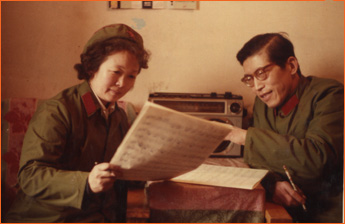 |
|
Mr. and Mrs. Zhang
|
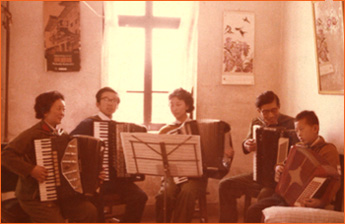 |
|
Ziqiang Zhang and family
|
|
|
|
|
|
Mrs. Zhang and son accompanying Chinese
Choir in 1980
|
|
|
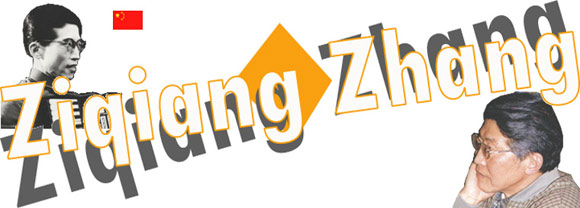
 I
joined the People's Republic of China Army in 1949 because the accordion
was the main instrument promoted by the government in the army.
I was 20 years old at the time, and began learning the accordion
when I enlisted in the army.
I
joined the People's Republic of China Army in 1949 because the accordion
was the main instrument promoted by the government in the army.
I was 20 years old at the time, and began learning the accordion
when I enlisted in the army. 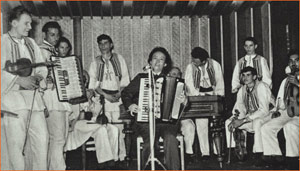
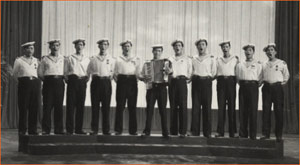
 The first time we toured outside of China was in 1954 when we went
to USSR, Romania, Poland, Czechoslovakia and returned in 1955. This
was a long trip, and we had a lot of time to stay in the countries
and meet and exchange ideas and information with the local accordionists.
The first time we toured outside of China was in 1954 when we went
to USSR, Romania, Poland, Czechoslovakia and returned in 1955. This
was a long trip, and we had a lot of time to stay in the countries
and meet and exchange ideas and information with the local accordionists. I
just loved music and entered the army originally as a baritone. However,
I loved the accordion so much, I began the accordion in the army and
learned very quickly and son changed to the accordion.
I
just loved music and entered the army originally as a baritone. However,
I loved the accordion so much, I began the accordion in the army and
learned very quickly and son changed to the accordion.  Since we were assigned to the same performing troop, this is how we
met. In 1954 when performing in USSR the Red Army Newspaper reported
in an article that the Chinese are here and called Mrs. Zhang 'Mrs.
Golden Finger.'
Since we were assigned to the same performing troop, this is how we
met. In 1954 when performing in USSR the Red Army Newspaper reported
in an article that the Chinese are here and called Mrs. Zhang 'Mrs.
Golden Finger.'